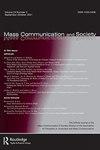谁说“穆斯林不是恐怖分子”?新闻分化,穆斯林与非穆斯林来源,以及对穆斯林的态度
IF 2.7
2区 文学
Q1 COMMUNICATION
引用次数: 0
摘要
媒体对恐怖主义的报道可能导致对穆斯林的负面态度。我们的理论是,未分化的新闻——即:没有明确区分穆斯林和恐怖分子——会加速这些负面影响。在基于配额的2(新闻分化:分化和未分化)x2(专家受访者来源:穆斯林和非穆斯林)受试者实验中(N = 291),参与者阅读有关伊斯兰恐怖主义的新闻。对照组则收到与恐怖无关的新闻。在von Sikorski等人(2017)的基础上,并扩展了这一研究领域,我们分析了对穆斯林的显性和隐性态度的影响。利用社会认同、自我分类和中介的群体间接触理论,研究结果表明,未分化的新闻增加了对穆斯林的敌对态度和态度的不分化。然而,未区分的新闻并没有激活内隐态度。我们还发现,当消息来源被认为是相似的(即非穆斯林)时,未区分的新闻具有最强的负面影响。本文章由计算机程序翻译,如有差异,请以英文原文为准。
Who Says “Muslims are Not Terrorists”? News Differentiation, Muslim versus Non-Muslim Sources, and Attitudes Toward Muslims
Media coverage on terrorism can lead to negative attitudes toward Muslims. We theorize that undifferentiated news—i.e. not explicitly distinguishing Muslims from terrorists—can accelerate these negative effects. In a quota-based 2 (news differentiation: differentiated and undifferentiated) × 2 (expert interviewee source: Muslim and non-Muslim) between-subjects experiment (N = 291), participants read news about Islamist terrorism. A control group received news unrelated to terror. Building on von Sikorski et al. (2017) and extending this line of research, we analyzed effects on explicit and implicit attitudes toward Muslims. Drawing on social identity, self-categorization and mediated intergroup contact theories, findings revealed that undifferentiated news increased hostile attitudes toward Muslims and attitudinal undifferentiation. However, undifferentiated news did not activate implicit attitudes. We also found that undifferentiated news had the strongest negative effects when coming from sources that are perceived as similar (i.e. non-Muslim).
求助全文
通过发布文献求助,成功后即可免费获取论文全文。
去求助
来源期刊

Mass Communication and Society
COMMUNICATION-
CiteScore
6.90
自引率
3.30%
发文量
58
期刊介绍:
Mass Communication and Society" mission is to publish articles from a wide variety of perspectives and approaches that advance mass communication theory, especially at the societal or macrosocial level. It draws heavily from many other disciplines, including sociology, psychology, anthropology, philosophy, law, and history. Methodologically, journal articles employ qualitative and quantitative methods, survey research, ethnography, laboratory experiments, historical methods, and legal analysis.
 求助内容:
求助内容: 应助结果提醒方式:
应助结果提醒方式:


